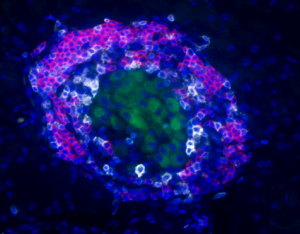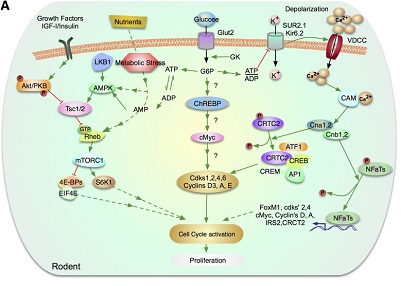 The Garcia-Ocana Laboratory focuses on developing innovative and effective therapies for pancreatic beta cell preservation, immune tolerance and pancreatic beta cell regeneration for the treatment of diabetes.
The Garcia-Ocana Laboratory focuses on developing innovative and effective therapies for pancreatic beta cell preservation, immune tolerance and pancreatic beta cell regeneration for the treatment of diabetes.

Pancreatic Islet from an NOD mouse Insulin (green) B220 (red) CD3 (white) DAPI (blue)
Conventional treatment of patients with diabetes relays on insulin injections. Unfortunately, hypo- and hyperglycemia may frequently occur and result in severe secondary complications. Diabetes is associated with progressive loss of functional pancreatic beta cells. In autoimmune type 1 diabetes (T1D), immune self-tolerance is lost leading to the destruction of pancreatic beta cells. Alternative therapies that enhance at the same time immune tolerance and pancreatic beta cell regeneration and protection could provide a more physiological approach for treating T1D.

Intracellular Signaling in Rodent Beta Cells. Diabetes 2014 63:819-831.
The pancreatic beta cell adapts to overnutrition, enhanced metabolic demand and insulin resistance by increasing its mass and function. This adaptation is orchestrated by signals derived from nutrient metabolism, growth factors and hormone signaling. Failure to expand in response to metabolic stress leads to excessive work load resulting in beta cell dysfunction, de-differentiation, death and development of type 2 diabetes (T2D). Understanding the mechanisms that regulate pancreatic beta cell adaptation to increased metabolic demand and insulin resistance is of great importance for the development of potential novel T2D modifying treatments.
